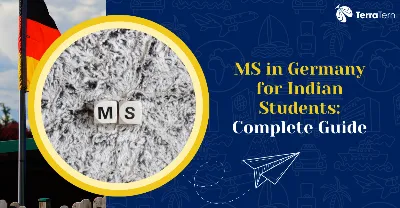Key Highlights
- What Makes MS in Germany the Best Choice for Indian Students in 2025?
- How Much Does MS in Germany Really Cost for Indian Students in 2025?
- What Are the Exact Semester Fees at German Universities?
- How Much Do Living Expenses Vary by German City in 2025?
- What Are the Hidden Costs Students Often Miss in Germany? Experts Insights 2025
- Which Scholarships Can Fund Your MS in Germany for Indian Students?
- How Does Deutschlandstipendium Operate in the Case of Indian Students?
- What are the Highest-Ranking German Universities to do MS?
- What Are the Admission Requirements in Germany by University Tier in 2025?
- What Are the Exact Admission Requirements for MS in Germany for Indians in 2025?
- What Are the Language Proficiency Requirements for an MS in Germany?
- How Does the German Student Visa Process Work for Indians in 2025?
- What Are the Blocked Account Requirements in Germany for 2025?
- What Are The Career Opportunities of MS in Germany 2025?
- Which Companies Actively Hire Indian MS Graduates in Germany in 2025?
- How to Prepare a Winning Application for MS in Germany in 2025?
- How to Write a Compelling Statement of Purpose for MS in Germany in 2025?
- What Application Timeline Should Indian Students Follow for MS in Germany 2025?
- Conclusion
The MS in Germany for Indian students is the best example of affordable world-class education for Indian students, with tuition-free education in more than 120 state-funded universities, a high number of scholarships for MS in Germany for Indian students, and strong employment opportunities after graduation. Germany has established itself as the best study destination in Europe; it has a high 49,000 Indian students who are already enrolled, as well as a high visa approval rate at 85 percent or above. Let’s know more about MS in Germany for Indian students!
The Indian students have several major strengths:
-
Free tuition in state colleges (by saving INR 15-50 lakhs over the US/UK)
-
Total annual cost: EUR 10,000-18,000 (INR 8.9-16 lakhs)
-
Cost of living: EUR 850-1400/month (INR 75000-125 lakhs)
-
DAAD and Deutschlandstipendium have 300+ scholarships for MS in Germany for Indian students.
18 months job search visa having 85 percent success rate.
-
EUR 44,000 and above yearly (INR 39 and above lakhs)
-
Permanent residence in 2-5 years.
What Makes MS in Germany the Best Choice for Indian Students in 2025?

Value Presentation in Germany, one can hardly find a better case of an MS in Germany for Indian students than the one offered by the country: high-quality education, low cost of MS in Germany for Indian students of living, and outstanding career opportunities. This special combination has turned it into an attractive area for Indian students in search of a good payoff.
Germany has a clear upper hand in cost of MS in Germany for Indian students and after study advantage as compared to other popular study destinations. Indian students who choose to pursue an MS in Germany for Indian students tend to make their decisions regarding the choice largely depending on the hard facts of its value proposition.
|
Factor |
Germany |
USA |
UK |
Canada |
|
Tuition Fees |
Free (Public) |
30,000-60,000 USD |
15,000-35,000 GBP |
20,000-40,000 CAD |
|
Total Cost/Year |
10,000-18,000 EUR |
50,000-80,000 USD |
25,000-45,000 GBP |
30,000-50,000 CAD |
|
Work During Studies |
20 hours/week |
Limited (F1 restrictions) |
20 hours/week |
20 hours/week |
|
Post-Study Work |
18 months |
12-36 months (STEM) |
2 years |
3 years |
|
Visa Success Rate |
85%+ |
65-75% |
70-80% |
75-85% |
How Much Does MS in Germany Really Cost for Indian Students in 2025?
It is also important to know the full financial picture as a student before studying abroad. The reality of the MS in Germany for Indian students has the cost of MS in Germany for Indian students of pre-departure, semester charges, living expenses, and other unspecified charges. Here’s a detailed breakdown.
What Are the Total Pre-Departure Expenses?
These are the first, once-in-a-lifetime costs of MS in Germany for Indian students that you will have to incur before you even set foot in Germany for MS in Germany for Indian students.
|
Expense Category |
Cost (EUR) |
Cost (INR) |
Details |
|
GRE Exam |
250 |
22,550 |
Valid for 5 years |
|
GMAT Exam |
265 |
23,000 |
Business programs |
|
IELTS Exam |
190 |
16,250 |
Most accepted |
|
TOEFL Exam |
200 |
16,900 |
Alternative to IELTS |
|
German Language (A1-B2) |
800-1,200 |
71,000-1,07,000 |
Goethe Institute |
|
Document Translation |
150-300 |
13,400-26,700 |
Certified translations |
|
WES/Uni-Assist Evaluation |
180-220 |
16,000-19,500 |
Credential evaluation |
|
University Application Fees |
75-150 per uni |
6,700-13,400 |
Usually 3-5 universities |
|
Student Visa Fee |
75 |
6,700 |
Consulate fee |
|
Travel Insurance |
80 |
7,100 |
Pre-arrival coverage |
|
Total Pre-Departure |
2,265-3,150 |
2,01,000-2,80,000 |
One-time investment |
What Are the Exact Semester Fees at German Universities?
While public universities don't charge tuition fees, they do require a semester contribution, which is often a nominal amount.
|
German State |
Semester Fee Range |
Includes Transportation |
Notes |
|
Berlin |
300-350 EUR |
Yes |
Covers all of Berlin's transport |
|
Bavaria (Bayern) |
100-6,000 EUR |
Varies |
TUM charges 4,000-6,000 EUR for some programs |
|
Baden-Württemberg |
1,500 EUR |
Yes |
Non-EU fee introduced in 2017 |
|
North Rhine-Westphalia |
270-330 EUR |
Yes |
Includes regional transport |
|
Lower Saxony |
350-380 EUR |
Yes |
Comprehensive transport coverage |
|
Hamburg |
320-350 EUR |
Yes |
City-wide transport included |
Also Read: Germany Study Visa Requirements: Latest Checklist
How Much Do Living Expenses Vary by German City in 2025?

Living costs can vary significantly based on the city. Bigger cities like Munich and Berlin are more expensive, while smaller cities offer more affordable options. Let’s know more about MS in Germany for Indian students and the cost of living Germany!
|
City |
Accommodation |
Food |
Transport |
Miscellaneous |
Total/Month |
|
Munich |
600-900 EUR |
250-300 EUR |
65 EUR (if not included) |
200-250 EUR |
1,115-1,515 EUR |
|
Berlin |
400-700 EUR |
200-250 EUR |
Included in the semester fee |
150-200 EUR |
750-1,150 EUR |
|
Hamburg |
450-750 EUR |
220-270 EUR |
Included |
180-220 EUR |
850-1,240 EUR |
|
Frankfurt |
500-800 EUR |
230-280 EUR |
85 EUR |
190-240 EUR |
1,005-1,405 EUR |
|
Dresden |
300-500 EUR |
180-220 EUR |
50 EUR |
120-160 EUR |
650-930 EUR |
|
Leipzig |
280-450 EUR |
170-210 EUR |
60 EUR |
110-150 EUR |
620-870 EUR |
|
Aachen |
350-550 EUR |
190-230 EUR |
Included |
130-170 EUR |
670-950 EUR |
What Are the Hidden Costs Students Often Miss in Germany? Experts Insights 2025
Besides the main expenses, students should also budget for hidden costs that can add up over time.
|
Hidden Cost Category |
Amount (EUR) |
Amount (INR) |
Frequency |
Details |
|
City Registration Fee |
10-50 |
900-4,500 |
One-time |
Mandatory registration at the local Bürgeramt. |
|
TV/Radio License Fee |
18.36/month |
1,630/month |
Monthly |
The Rundfunkbeitrag is a mandatory fee per household. |
|
Security Deposit (Housing) |
600-1,800 |
53,000-1,60,000 |
One-time |
2-3 months' rent, usually refundable. |
|
Furniture Setup |
200-700 |
17,800-62,300 |
One-time |
For unfurnished accommodation, this can add up. |
|
Health Insurance Gap |
30-90 |
2,700-8,000 |
Initial months |
To cover the period before your blocked account is active. |
|
Bank Setup & Charges |
50-150/year |
4,500-13,400/year |
Annual |
Fees for bank account setup and annual maintenance. |
|
Residence Permit Extension |
100-110 |
8,900-9,800 |
Annual |
Required after your first year of study. |
|
Study Materials |
100-300/year |
8,900-26,700/year |
Annual |
Costs for books, software, and lab equipment. |
|
German Language Course |
300-1,000 |
26,700-89,000 |
Optional |
For students who wish to improve their language skills locally. |
Which Scholarships Can Fund Your MS in Germany for Indian Students?
Securing scholarship for MS in Germany for Indian students can significantly reduce the financial burden of studying abroad. Several major scholarships for MS in Germany for Indian students are available through governmental and private organizations.
What Are the Major DAAD Scholarship Programs for Indians?
The German Academic Exchange Service (DAAD) is a primary source of scholarship for MS in Germany for Indian students
|
Scholarship Program |
Monthly Stipend |
Duration |
Coverage |
Success Rate |
Application Deadline |
|
DAAD Graduate School |
1,200 EUR |
12-24 months |
Full tuition + living + travel |
8-12% |
September 30 |
|
DAAD Development-Related |
861 EUR |
12-24 months |
Tuition + living + insurance |
10-15% |
July 31/August 31 |
|
DAAD Research Grants |
1,200 EUR |
7-10 months |
Living + research costs |
12-18% |
November 15 |
|
DAAD Study Scholarships |
861 EUR |
10-24 months |
Living + tuition + travel |
6-10% |
October 31 |
|
DAAD EPOS Program |
1,200 EUR |
18-24 months |
Full coverage + internship |
15-20% |
Varies by program |
Requirements of DAAD Application:
-
Academic Excellence: 75% or 8.0/10 CGPA Minimum.
Work Experience: 2+ years (not mandatory)
-
English (IELTS 6.5+) or German (B2+): Language Proficiency.
-
Motivation Letter: 1-2 pages explaining the study objectives.
-
Research Proposal: In institutions that are research-based.
-
Recommendations Letters: 2-3 academic/professional references.
How Does Deutschlandstipendium Operate in the Case of Indian Students?

Deutschlandstipendium is a government and industry scholarship, funded by universities themselves. Let’s know more about MS in Germany for Indian students!
|
Aspect |
Details |
Benefits for Indians |
|
Monthly Amount |
300 EUR (150 government + 150 private) |
Tax-free income supplement |
|
Duration |
Usually 2 semesters (renewable) |
Can cover the entire master's duration |
|
Eligibility |
Merit-based, social engagement |
No citizenship restrictions |
|
Application Process |
Directly through universities |
University-specific criteria |
|
Selection Rate |
15-25% depending on the university |
Higher at technical universities |
|
Additional Benefits |
Mentoring, networking events |
Industry connections in Germany |
What University-Specific Scholarships Are Available?
A lot of universities have their own scholarship programs to entice the best international talent.
-
TU Munich: TUM Global Incentive (300-1,000 EUR/month, merit-based)
-
University of Bonn: International Scholarship (400-800 EUR/month, based on academic excellence)
-
RWTH Aachen: RWTH International (300-600 EUR/month, engineering students).
-
Free University Berlin: Deutschlandstipendium Plus (500 EUR/month, for high achievers)
-
University of Stuttgart: Baden-Württemberg State-sponsored Scholarship (350 EUR/month)
Also Read: Is the German Language Compulsory to Study in Germany?
What are the Highest-Ranking German Universities to do MS?
Germany has among the world's renowned universities with excellent engineering, science, and business courses. One of the important processes involved in the application is the selection of the appropriate university.
What Are the Global Rankings of German Universities?
Here are the global rankings of German University:
|
University |
QS World Ranking |
THE World Ranking |
Strong Programs |
Indian Students |
Acceptance Rate |
|
Technical University of Munich |
37 |
43 |
Engineering, Computer Science, Business |
2,500+ |
15-20% |
|
LMU Munich |
54 |
38 |
Medicine, Life Sciences, Physics |
1,800+ |
20-25% |
|
Heidelberg University |
87 |
44 |
Medicine, Natural Sciences |
1,200+ |
25-30% |
|
Free University of Berlin |
98 |
83 |
Social Sciences, Humanities |
1,500+ |
30-35% |
|
RWTH Aachen University |
106 |
79 |
Engineering, Technology |
2,200+ |
18-22% |
|
Technical University of Berlin |
154 |
149 |
Engineering, Computer Science |
1,900+ |
25-30% |
|
University of Bonn |
132 |
76 |
Mathematics, Physics, Economics |
800+ |
30-35% |
|
KIT Karlsruhe |
119 |
133 |
Engineering, Natural Sciences |
1,600+ |
20-25% |
Which Programs Are Most Popular Among Indian Students?
Here is a list of the most popular programs among Indian students:
|
Program Category |
Popular Specializations |
Top Universities |
Average Intake |
Job Market Demand |
|
Computer Science |
AI, Data Science, Cybersecurity |
TUM, TU Berlin, RWTH Aachen |
800+ students/year |
Very High |
|
Engineering |
Mechanical, Electrical, Automotive |
RWTH Aachen, TUM, KIT |
1,200+ students/year |
Very High |
|
Business |
Management, Finance, International Business |
Mannheim, Frankfurt School |
600+ students/year |
High |
|
Data Science |
Machine Learning, Analytics |
TUM, University of Bonn |
400+ students/year |
Very High |
|
Renewable Energy |
Sustainable Engineering |
Freiburg, Oldenburg |
300+ students/year |
High |
|
Biotechnology |
Bioengineering, Life Sciences |
Heidelberg, LMU Munich |
250+ students/year |
Medium-High |
What Are the Admission Requirements in Germany by University Tier in 2025?

Tier 1 Universities (QS Top 100) Requirements:
-
CGPA: 8.5/10 or 85%+ (First Class with Distinction)
-
GRE: 315+ (Quantitative: 155+, Verbal: 160+)
-
IELTS: 7.0+ (no band below 6.5)
-
Work Experience: 2+ years preferred
-
Research Experience: Publications/projects highly valued
-
SOP: 1,000-1,500 words, program-specific
-
LORs: 3 strong recommendations (2 academic + 1 professional)
Tier 2 Universities (QS 100-200) Requirements:
-
CGPA: 7.5/10 or 75%+ (First Class)
-
GRE: 305+ (optional for some programs)
-
IELTS: 6.5+ (no band below 6.0)
-
Work Experience: 1+ years preferred
-
SOP: 800-1,200 words
-
LORs: 2-3 recommendations
What Are the Exact Admission Requirements for MS in Germany for Indians in 2025?
A successful application hinges on meeting the specific admission requirements. This involves more than just a good GPA; it requires careful preparation and an understanding of the German academic system.
What Academic Qualifications Do Indian Students Need?
Here are the academic qualification that Indian students need:
|
Program Type |
Minimum Education |
CGPA/Percentage |
Subjects Required |
Additional Requirements |
|
Consecutive Masters |
Related Bachelor's (3-4 years) |
7.0/10 or 70%+ |
Directly related field |
70%+ match in curriculum |
|
Non-Consecutive Masters |
Any Bachelor's degree |
7.5/10 or 75%+ |
Any field accepted |
Work experience preferred |
|
Research Masters |
Bachelor's with a research component |
8.0/10 or 80%+ |
Related field mandatory |
Research proposal required |
|
Professional Masters |
Bachelor's + work experience |
7.0/10 or 70%+ |
Related professional field |
2+ years of experience |
Credit Transfer Requirements:
-
ECTS Credits: Minimum 180 ECTS for a bachelor's degree (equivalent to 3 years)
-
Course Matching: 70%+ curriculum overlap for consecutive programs
-
Grade Conversion: The German grade scale is 1.0-4.0 (1.0 = excellent)
What Are the Language Proficiency Requirements for an MS in Germany?
You'll need to prove your proficiency in either English or German.
|
Test |
Minimum Score |
Preferred Score |
Validity |
Cost (INR) |
Preparation Time |
|
IELTS Academic |
6.0 (no band <5.5) |
7.0+ (no band <6.5) |
2 years |
16,250 |
2-3 months |
|
TOEFL iBT |
80 (R:19, L:19, S:19, W:19) |
95+ (all sections 22+) |
2 years |
16,900 |
2-3 months |
German Language Requirements:
-
English-taught Programs: Not required
-
German-taught Programs: B2-C1 level (DSH-2/TestDaF 4)
-
Mixed Programs: A2-B1 preferred
Are GRE/GMAT Scores Mandatory?
Standardized test requirements vary by program and university for MS in Germany for Indian students.
|
Program Category |
GRE Requirement |
GMAT Alternative |
Minimum Scores |
Waiver Conditions |
|
Engineering |
Recommended |
Not accepted |
GRE: 305+ |
Strong academic record |
|
Computer Science |
Highly recommended |
Not accepted |
GRE: 315+ |
Industry experience |
|
Business/MBA |
Optional |
Preferred |
GMAT: 600+ |
Work experience 3+ years |
|
Natural Sciences |
University-specific |
Not accepted |
GRE: 300+ |
Research background |
How Does the German Student Visa Process Work for Indians in 2025?

The student visa application for MS in Germany for Indian students is a critical step that requires meticulous preparation. Understanding the process and common pitfalls is key to a smooth journey.
What Is the Complete Student Visa Application Process?
Here is the complete process for students application MS in Germany for Indian students:
Phase 1: Pre-Application Preparation (3-4 months prior to travel)
-
Get an admission letter to a German university.
-
Open and deposit a blocked account of 11,904 EUR in 2025.
-
Work out German health insurance.
-
Blackmail all necessary documents.
-
Appoint a visa meeting at the German consulate.
Phase 2: Preparation of documents (1-2 months)
-
Passport: 6+ months validity.
-
Admission Letter: Original acceptance of the university.
-
Academic papers: All degree certificates, mark sheets.
-
Blocked Account Certificate: Certificate of EUR 11,904 deposit.
-
Health Insurance: coverage approved in Germany.
-
Certificates of language: IELTS/TOEFL/German.
-
Motivation Letter: An interesting personal statement.
-
CV/Resume: Academic and professional history.
-
Photos on a Passport: Biometric, German.
Phase 3: Submission of Visa Application
-
Visa Fee: 75 EUR (6700 INR) is not refundable.
-
Processing Time: 6-12 weeks, more so during the peak season.
What Are the Blocked Account Requirements in Germany for 2025?
Here are some of the blocked account requirements for MS in Germany for Indian students:
|
Aspect |
2025 Requirements |
Details |
|
Minimum Amount |
11,904 EUR (10.6 lakhs INR) |
Increased from 11,208 EUR in 2024 |
|
Monthly Access |
992 EUR |
Automatically released each month |
|
Purpose |
Living expenses proof |
Visa requirement + actual living costs |
|
Bank Options |
Deutsche Bank, Expatrio, Fintiba |
Choose based on services |
Interpretations of Congregationalism and Baptism Comparison:
-
Expatrio: 49 EUR to set up, 5.90 EUR/month, and 1-2 weeks to process.
-
Fintiba: 89 a one-time fee, 4.90 a monthly fee, 2-3 weeks processing.
How high are the Visa Success Rates, and what are the most frequent reasons for rejection?
-
Overall Success Rate: 87% (2024 data).
-
First-time Applications: 82% approval.
Common Rejection Reasons:
-
Lack of Financial Evidence: 35% of rejection.
-
Textbook Half-Baked Documentation: 25% of rejections.
-
Irregular Information: 20% rejection.
-
Poor Study Motivation: 1 out of 10 rejections.
What Are The Career Opportunities of MS in Germany 2025?
Indian graduates stand on a strong career platform since the German economy and the need to hire skilled personnel are very strong. Let’s know more about MS in Germany for Indian students.
What Are the Average Salaries for Indian MS Graduates?
Here is the breakdown of average salaries for Indian MS Graduate:
|
Industry |
Entry-level Salary |
3-Year Experience |
5+ Year of Experience |
Growth Rate |
|
Information Technology |
45,000-55,000 EUR |
65,000-80,000 EUR |
90,000-120,000 EUR |
15-20% annually |
|
Automotive Engineering |
48,000-58,000 EUR |
70,000-85,000 EUR |
95,000-130,000 EUR |
12-15% annually |
|
Data Science/Analytics |
50,000-60,000 EUR |
75,000-90,000 EUR |
100,000-140,000 EUR |
18-22% annually |
|
Consulting |
52,000-65,000 EUR |
80,000-100,000 EUR |
120,000-180,000 EUR |
20-25% annually |
Which Companies Actively Hire Indian MS Graduates in Germany in 2025?

Here is a list of companies actively hiring Indian MS Graduate:
-
SAP: Roles in development and consulting.
-
Siemens: Engineers and project managers.
-
BMW Group: Design and R&D engineers.
-
Bosch: Engineers and developers across various divisions.
-
Volkswagen: Engineers and analysts.
-
Deutsche Bank: Analysts and risk managers.
What Is the Path to Permanent Residency?
Here is the path to permanent residency after MS in Germany for Indian students:
|
Timeline |
Status |
Requirements |
Benefits |
|
0-18 months |
Job Search Visa |
Valid graduation, active job search |
Work permission |
|
18 months-2 years |
Work Visa |
Employment contract, salary threshold |
Full work rights |
|
2-5 years |
EU Blue Card |
58,400 EUR+ salary, university degree |
Fast-track to permanent residence |
|
5+ years |
Permanent Residence |
5 years residence, B1 German, integration |
Unrestricted work, social benefits |
|
8+ years |
German Citizenship |
8 years residence, B2 German, integration |
EU passport, voting rights |
Also Read: Pursue Civil Engineering Jobs in Germany: Everything You Need To Know
How to Prepare a Winning Application for MS in Germany in 2025?
A strong application strategy is the foundation of a successful admission in MS in Germany for Indian students.
What Is the Optimal University Selection Strategy?
Here is the optimal university selection strategy for MS in Germany for Indian students!
|
Selection Criteria |
Weight |
Evaluation Method |
Key Considerations |
|
Program Ranking |
25% |
QS/THE subject rankings |
Choose top 3 in your field |
|
Admission Probability |
25% |
Your profile vs. requirements |
Apply to 40-60% match universities |
|
Location & Cost |
20% |
City living costs analysis |
Balance quality with affordability |
|
Industry Connections |
15% |
Alumni network, partnerships |
Research placement rates |
|
Research Opportunities |
10% |
Faculty research, facilities |
Align with career goals |
How to Write a Compelling Statement of Purpose for MS in Germany in 2025?

A powerful SOP is a narrative that connects your past achievements to your future goals.
|
Section |
Word Count |
Content Focus |
Key Elements |
|
Introduction |
150-200 words |
Motivation, academic background |
Program interest, goals |
|
Academic Journey |
250-300 words |
Educational achievements, coursework |
Specific examples, quantified results |
|
Professional Experience |
200-250 words |
Work experience, projects |
Leadership, technical competencies |
|
Research Interests |
200-250 words |
Specific research areas, faculty |
Future research goals |
|
Why Germany/University |
150-200 words |
Program fit, university choice |
Specific reasons, unique features |
|
Career Goals |
200-250 words |
Short/long-term objectives |
Clear progression, impact vision |
|
Conclusion |
100-150 words |
Summary, commitment |
Strong closing, enthusiasm |
What Application Timeline Should Indian Students Follow for MS in Germany 2025?
Here is a detailed, step-by-step application timeline for MS in Germany for Indian students aiming to pursue. Following this plan can help you manage the process efficiently and increase your chances of admission to your desired university.
18-15 Months Before (January-June, Year 1):
-
Define career goals and program preferences.
-
Begin IELTS/TOEFL and GRE preparation.
-
Start university research and shortlist.
12-9 Months Before (July-December, Year 1):
-
Take standardized tests.
-
Finalize your list of 7-10 universities.
-
Draft your SOP and request recommendation letters.
-
Begin researching scholarships.
6-3 Months Before (January-June, Year 2):
-
Submit all university and scholarship applications.
-
Track application status and prepare for interviews.
-
Receive and accept university offers.
0-3 Months Before (July-September, Year 2):
-
Prepare and submit your student visa application.
-
Complete the blocked account deposit and health insurance setup.
-
Plan your travel and arrival in Germany.
Conclusion
Pursuing an MS in Germany for Indian students represents one of the most strategic educational investments Indian students can make in 2025, combining world-class education with exceptional affordability and career prospects. With tuition-free education at over 120 public universities, comprehensive scholarship opportunities worth up to 1,200 EUR monthly, and robust post-graduation employment prospects averaging 44,000 EUR+ starting salaries, Germany continues to solidify its position as Europe's premier study destination for Indian students.
The comprehensive support ecosystem, from the 18-month job search visa to clear pathways for permanent residency, ensures that Indian graduates can build successful long-term careers in Europe's largest economy. With proper planning, strong applications, and strategic university selection, Indian students can access this exceptional opportunity and join the 49,000+ Indian students already thriving in Germany's dynamic academic and professional landscape. Visit TerraTern to know more!
"Your Ultimate Guide to Pursuing an MS in Germany: Costs, Scholarships, and Career Opportunities for Indian Students in 2025"






